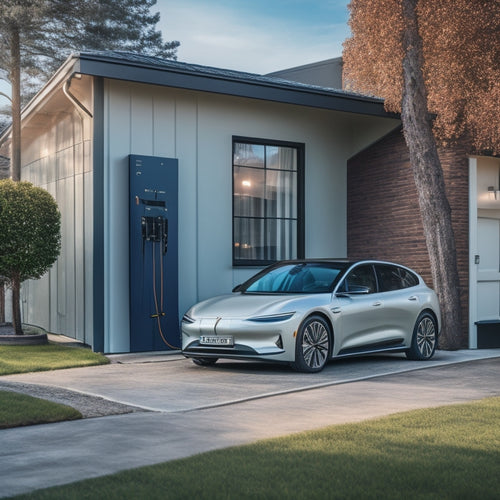
What Are the Essential Costs of Solar Panels and Battery Storage
Share
You'll need to contemplate several essential costs when investing in a solar panel system with battery storage. Upfront costs for the solar panels range from $15,000 to $30,000, while battery storage expenses range from $5,000 to $15,000. Installation and labor costs add another $2,000 to $5,000. Ongoing maintenance fees, including monitoring services and warranty coverage, can cost $100 to $300 per year. Inverter replacement expenses will arise in the future, with costs ranging from $1,000 to $5,000. Understanding these costs will help you plan and budget effectively - and there's more to investigate to get the full image of your investment.
Key Takeaways
- The upfront cost of solar panels ranges from $15,000 to $30,000, depending on system size, quality, and installation company.
- Battery storage system expenses vary from $5,000 to $15,000, depending on type, quality, and system capacity.
- Installation and labor costs range from $1,000 to $5,000, including permits, electrical upgrades, and structural modifications.
- Ongoing maintenance fees include monitoring services, extended warranty coverage, and regular inspections, totaling $100 to $3,000 annually.
- Inverter replacement expenses range from $1,000 to $5,000, depending on inverter type and lifespan, which can vary from 10 to 25 years.
Upfront Costs of Solar Panels
When considering solar panels, your initial investment is vital, as it sets the stage for your long-term energy savings. The upfront costs of solar panels can be a significant outlay, but they're a key step towards reducing your reliance on the grid and lowering your energy bills.
The total cost of your solar panel system will depend on several factors, including the size of the system, the type and quality of the equipment, and the installation company you choose.
On average, you can expect to pay between $15,000 and $30,000 for a residential solar panel system. However, there are financing options available to help make solar more accessible. You may be able to secure a loan or lease a system, allowing you to spread the cost over time.
Additionally, government incentives like the Solar Investment Tax Credit (ITC) can help reduce your upfront costs. By taking advantage of these incentives, you can bring the cost of your system down to a more manageable level.
Battery Storage System Expenses
As you contemplate pairing your solar panel system with a battery storage system, you'll want to take into account the additional expenses involved. The cost of a battery storage system depends on several factors, including the type and quality of the batteries, the system capacity, and energy efficiency.
Some of the key expenses to evaluate are:
-
Battery Cost: The cost of the batteries themselves, which can range from $5,000 to $15,000 or more, depending on the type and quality.
-
Inverter and Charge Controller: The cost of the inverter and charge controller, which can range from $1,000 to $3,000.
-
Mounting and Installation Hardware: The cost of the mounting and installation hardware, which can range from $500 to $2,000.
- Monitoring and Control Systems: The cost of the monitoring and control systems, which can range from $500 to $2,000.
These expenses will vary depending on the specific components and system capacity you choose.
It's crucial to assess these costs carefully to guarantee you get the best value for your money.
Installation and Labor Costs
Several factors contribute to the overall cost of installing a battery storage system, and installation and labor costs are a significant portion of the total expense. These costs vary depending on the complexity of the installation, the location, and the type of battery storage system you're installing.
You'll need to evaluate the cost of installation permits, which can range from $500 to $2,000, depending on your local government's fees. Labor costs will also vary, but expect to pay around $1,000 to $3,000 for a standard installation.
When exploring financing options, you may want to contemplate bundling your installation and labor costs into a single loan or financing package. This can help you spread the cost over time, making it more manageable.
Be sure to research and compare different financing options to find the one that works best for you. Remember to factor in any additional costs, such as electrical upgrades or structural modifications, which may be required for a safe and efficient installation.
Ongoing Maintenance Fees
One vital aspect of battery storage system ownership is the ongoing maintenance fees. These costs are essential to guarantee your system operates efficiently and safely.
As you consider your investment, you'll want to factor in the following expenses:
-
Monitoring services: These services track your system's performance, alerting you to any issues and providing observations to enhance energy production. Expect to pay around $100 to $300 per year.
-
Warranty coverage: While your initial warranty may cover parts and labor, extended warranty coverage can provide added peace of mind. This may cost between $500 to $2,000 per year, depending on the provider and system size.
-
Regular inspections: Scheduled inspections help identify potential problems before they become major issues. You can expect to pay $100 to $500 per inspection, depending on the frequency and complexity.
- Software updates: As technology advances, your system's software may require updates to guarantee peak performance. These updates may be included in your monitoring services or warranty coverage, but if not, expect to pay around $100 to $500 per update.
Inverter Replacement Expenses
Your battery storage system's inverters play a critical role in converting DC power from your solar panels into usable AC power for your home. They're crucial for making certain you can utilize the energy generated by your solar panels.
However, like any electronic component, inverters have a limited lifespan and will eventually need to be replaced.
The cost of inverter replacement varies depending on the type of inverter you have. String inverters, which are the most common type, typically need to be replaced every 10 to 15 years. Microinverters, on the other hand, can last up to 25 years.
The inverter lifespan also depends on factors such as the quality of the component, environmental conditions, and maintenance.
When budgeting for inverter replacement, you can expect to pay between $1,000 to $3,000 for a string inverter and up to $5,000 for a microinverter.
It's important to factor these costs into your overall solar panel and battery storage system budget to make certain you're prepared for future replacements.
Frequently Asked Questions
Do Solar Panels Work During Power Outages Without Battery Storage?
You can't rely on solar panels alone during power outages without battery storage, as they'll shut down for safety reasons; however, with battery storage, you'll achieve grid independence and enjoy energy savings even when the grid is down.
Can I Install Solar Panels on a Rented Property?
"When in Rome, do as the Romans do" - in this case, you'll need to get your landlord's approval before installing solar panels on a rented property, securing solar panel permissions that align with their rules and regulations.
Are Solar Panels Resistant to Hail and Extreme Weather?
You'll be relieved to know that most solar panels are designed with hail resistance and weather durability in mind, withstanding impacts from hail up to 1 inch in diameter and extreme temperatures, ensuring your investment stays protected.
Can I Use Solar Panels to Charge My Electric Vehicle?
You're wondering if you can charge your electric vehicle with solar panels. Investigating the theory, we find that high-efficiency solar panels can indeed charge your EV, ensuring compatibility, as long as your system's capacity matches your vehicle's power requirements.
Do Solar Panels Increase My Property's Resale Value?
You'll be pleased to know that installing solar panels can enhance your property's resale value, as a property appraisal will reflect the energy savings and eco-friendly appeal, making your home more attractive to potential buyers.
Conclusion
You've finally decided to utilize the power of the sun and store it for a rainy day - figuratively, of course, since solar panels don't work on rainy days. Ironically, the cost of going green isn't exactly green-friendly on your wallet. From upfront solar panel costs to battery storage system expenses, installation and labor costs, ongoing maintenance fees, and inverter replacement expenses, it's a significant investment. But hey, at least you'll be saving the planet - and some cash on your energy bills - in the long run.
Related Posts
-

5 Essential Tips for Buying EV Charging Systems Online
When purchasing an EV charging system online, you'll want to make sure you're making an informed decision. First, det...
-

Top 10 DIY Conversion Kit Reviews and Tips
You're taking the first step towards electrifying your ride, and with the right DIY conversion kit, you'll be cruisin...
-

Safely Staying on Course: 5 Essential Lane Tips
You're about to take your driving skills to the next level by mastering the art of staying in your lane. First, inves...


